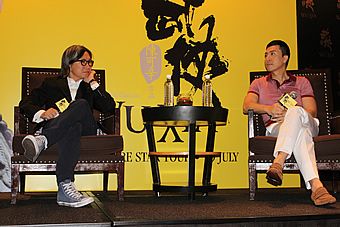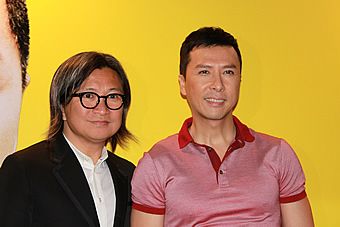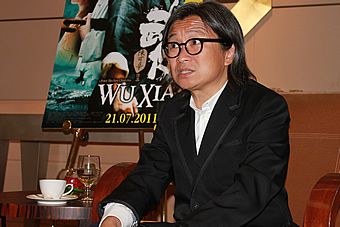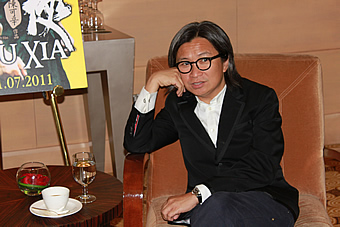'YEN-MISTRY' |
|
Call it ‘Yen-mistry’- that was what Peter Chan felt with Donnie Yen on the set of ‘Bodyguards and Assassins’. Peter was producer of the Teddy Chan film which starred Donnie, and there was an instant chemistry between the two which paved the way for their first collaboration, the martial arts epic ‘Wu Xia’.
Indeed, so strong was this ‘Yen-mistry’ that Peter decided that he wanted Donnie as the leading actor for his next film even before there was a script. The feeling was mutual, and Donnie had agreed to book his schedule last year to film a movie with Peter Chan before he knew what character he would be playing or what kind of a movie it would be.
“After watching Donnie act in ‘Bodyguards and Assassins’, I thought to myself that it was some of the best action I’ve seen in recent years, as well as the most realistic- and I told Donnie that we should work on a movie together,” says Peter. “But I told Donnie that it would be on a condition- that he would be the action director of the film- because I really don’t have much experience and expertise with fighting sequences.”
At the press conference to promote the movie, Peter and Donnie say that the idea to make ‘Wu Xia’ came when both of them started talking about the 70s and 80s Shaw Brothers ‘wu xia’ movies that they used to watch as children (like Chang Cheh’s ‘One-Armed Swordsman’). Eventually, they decided that they would make a movie which would pay homage to these classics- though Peter was clear that he wouldn’t want to simply remake them.

“You cannot just repeat what already has been done. I think both Donnie and I were in agreement on that,” says Peter. “So we adopted the story structure of the traditional ‘wu xia’ movies, that of an assassin who goes into hiding and is hunted by his past enemies, but we constantly looked for new methods of storytelling.” This quest led them to explore forensic science and acupuncture, and how these subjects could be weaved into the story.
The result is a movie that has been termed an ‘unconventional’ ‘wu xia’ film, and has been praised for injecting life into what has otherwise become a tired genre. Some critics have also compared the film, which uses CGI in its depictions of the human anatomy, as a CSI-inspired equivalent in Asia- though Peter says that his inspiration did not come from that hit Jerry Bruckheimer TV series.
“I’ve never watched an episode of CSI in truth,” he says. “Rather, I had the idea when I was watching a programme on Discovery Channel which showed how a bullet penetrated a body.” But Peter will admit that the liberties he has taken with the genre include many Western references that made it unlike a traditional ‘wu xia’ movie- after all, which ‘wu xia’ movie has a ‘rock n roll’ soundtrack?

Once they decided on the style of the film, the next step was to fill in the characters that would populate the movie. Takeshi Kaneshiro’s role was the result of rationalising that the movie needed a voiceover to explain the CG images of the human anatomy, and therefore came Xu Baijiu the detective. Peter explains that despite having worked with Takeshi thrice before, Xu was the most uncharacteristic Takeshi character.
“He’s not a swoon some idol you would associate with Takeshi, so at the start, Takeshi had some difficulty trying to get into character,” says Peter. “I tried many ways to help him, for example, putting a hat on his head, but Takeshi still had inhibitions. Eventually, Takeshi came up with the idea of speaking with a Sichuan accent, and I told him he could definitely try it if it works and it really did.”
Another character worth mentioning in the film is that of the leader of a group of lethal assassins, played by Taiwanese screen icon Jimmy Wang Yu. Casting the character was a great challenge for Peter, as they needed someone of enough stature to command the screen with a menacing presence within what limited screen time there was. It was Peter’s production designer Yee Chung Man who suggested approaching Wang Yu, and for those who are curious, the reference to the ‘One-Armed Swordsman’ in the film came from Donnie after this casting coup.
The pairing of Donnie and Wang Yu was electric, especially when watching the action veterans go at each other during the climactic sequence. Peter is full of praise of Donnie’s work on the movie with regard to the action sequences, where Donnie was both in front of the camera and behind as action director. In fact, when it came to the filming of these scenes, Peter pretty much left Donnie to take the reins by himself.
“Donnie is a true perfectionist. There was this scene where Donnie’s character Liu Jinxi was supposed to leap off the ground, kick against a wall and lunge at his opponent. Donnie did many many takes just for that short sequence alone, and I was puzzled because each one of them looked perfect to me,” he says. “It was only after that I realised Donnie wanted his legs to be straight when he kicked off the wall, so he repeated the sequence again and again just to get that right.”


Peter also says that Donnie’s acting marks a breakthrough for him as well. He commends Donnie for the thought he had put into the character’s dramatic moments, adding that he did not need to provide much direction for Donnie to grasp its nuances. He also denies playing to Donnie’s strengths as an actor on this movie- rather, Donnie pretty much had the character figured out on his own. This was also the chemistry he says he came to realise he shares with Donnie, and he was pleasantly surprised at how well they worked together.
Asked whether he has any plans to collaborate with Donnie in the near future once again, Peter is certain that there will definitely be such opportunities in the horizon. The prolific producer whose own production company WE Pictures is behind this film has set his sights on the burgeoning Chinese film market (where he is frank most of the box-office receipts hail from), and says that he would like to return to directing on a more frequent basis.

“My sense is that the Chinese audience is more discerning, and WE Pictures is not at a stage where we are financially sound to indulge in big-budget technical stuff, so our output will still be very much story-driven,” says Peter. “It’s actually better for me as a director, so I’ve decided… that I should not only work but more as a director. I’m coming back to a directing stage in my career.”
And of course, judging by the quality of Peter Chan’s works, as well as this latest collaboration with Donnie Yen, it only means good- if not great- stuff ahead for both actor and director.
Text by Gabriel Chong; Photos by Linus Tee
 |
|
|
